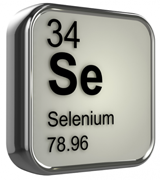Selenium - Uses, Benefits, Sources and Dosage

Selenium is a trace mineral which is found in soil, certain foods and also available in the small amount in water. It is also a crucial mineral for our body. Selenium acts as antioxidant when it combines with vitamin E. Antioxidants fight against the free radicals which may result in the damage of DNA and cell membrane. These free radicals are responsible for ageing and other health complications like cancer and heart diseases. Thus selenium also neutralizes the free radicals and prevents the body from damage. It has been studied that daily consumption of selenium is good for male and female fertility.
Benefits of Selenium
- Selenium acts as the antioxidant thus helps to reduce the oxidative stress of body. Selenium with other antioxidants like vitamin E is also effective for colon and prostate cancer.
- It helps in the proper functioning of immune system. It has been found that used of selenium is useful in the slowing down the progression of HIV into AIDS.
- It helps in the proper blood flow and also reduces the free radical oxidative stress. Thus supports the good heart health and reduces the chances of heart diseases.
- It supports the good function of thyroid gland.
- It also reduces the chances of asthmatic attack.
- It also reduces the chances of rheumatoid arthritis.
- It also helps in healthy metabolism.
Food Sources
Sea foods like shellfish are the richest food sources of selenium. Red meat, grains, brown rice, eggs, and garlic are also the good source of selenium. Dairy products like yogurt, milk, cottage cheese contain the significant amount of selenium. Vegetables like lentils, lettuce, green peas, potato, spinach and carrots also contain the good amount of selenium.
High Amounts of Selenium
Excess selenium in blood results in a condition called as selenosis. This condition results in problems like hair loss, fatigue, nausea, bad breath irritability and minor nerve damage. An overdose of selenium may also result in kidney, liver and heart complications.
Deficiency of Selenium
- Deficiency of selenium may lead to myocardial necrosis which results in the weakening of heart.
- Low amount of selenium in the body also contribute to Kashin Beck disease in which there is degeneration, atrophy and necrosis of cartilage tissues in the joints.
- Due to selenium deficiency body become more susceptible to other diseases.
- Selenium deficiency is also responsible for hypothyroidism and symptoms may include excess fatigue, goiter, miscarriages and mental retardation.
Daily Intake Recommendation of Selenium
Infants
- 0-6 months requires 15 micrograms (mcg)
- 7-12 months requires 20 mcg.
Children
- 1-3 year requires 20mcg
- 4-8 year requires 30 mcg
- 9-13 years requires 40 mcg
In adults
- Above the age of 14 selenium requirement both in the case of male and females is 50 mcg.
- In case of pregnant women selenium required is 60 mcg.
- In the case of lactating mothers selenium needed is 9mg.



